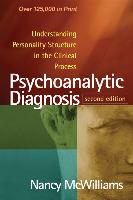This acclaimed clinical guide and widely adopted text has filled a key need in the field since its original publication. Nancy McWilliams makes psychoanalytic personality theory and its implications for practice accessible to practitioners of all levels of experience. She explains major character types and demonstrates specific ways that understanding the patient's individual personality structure can influence the therapist's focus and style of intervention. Guidelines are provided for developing a systematic yet flexible diagnostic formulation and using it to inform treatment. Highly readable, the book features a wealth of illustrative clinical examples. New to This Edition*Reflects the ongoing development of the author's approach over nearly two decades.*Incorporates important advances in attachment theory, neuroscience, and the study of trauma.*Coverage of the contemporary relational movement in psychoanalysis.*A number of the case examples are entirely new.


